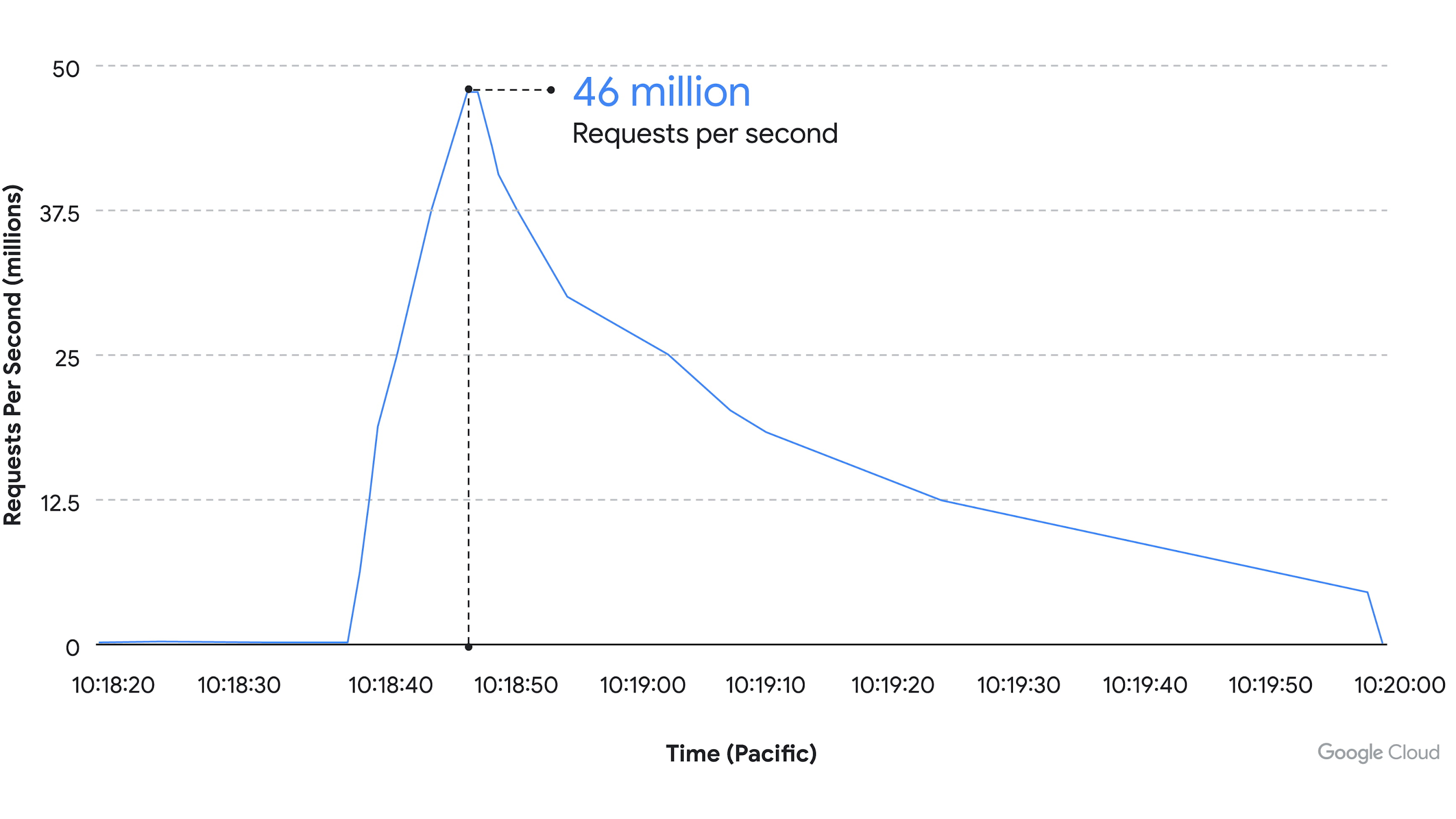Record for the largest ever HTTPS DDoS attack smashed once again
The DDoS attack lasted 69 minutes and surpassed the previous record of 26 million RPS

Sign up today and you will receive a free copy of our Future Focus 2025 report - the leading guidance on AI, cybersecurity and other IT challenges as per 700+ senior executives
You are now subscribed
Your newsletter sign-up was successful
Google Cloud claims to have repelled the biggest HTTPS DDoS attack ever recorded after a Cloud Armor customer was targeted by attacks peaking at 46 million requests per second (RPS).
The DDoS attack, which occurred on June 1, initially targeted the victim's HTTPS Load Balancer with 10,000 RPS. Based on data derived from traffic analysis, Google's Cloud Armor Protection initiated an alert eight minutes later, once the attack had intensified to 100,000 RPS.
Just two minutes later, the attack surged to 46 million RPS, almost 80% higher than the previous record of 26 million RPS, set during an attack on a Cloudflare customer in June.
Google claims that, at its peak, the scale of the attack was equivalent to receiving the entirety of Wikipedia's daily traffic in just 10 seconds. The attack is said to have lasted 69 minutes in total, steadily declining in RPS following the initial peak.

Researchers at Google identified 5,256 source IPs from 132 countries in connection with the attack. Encrypted requests (HTTPS) were also leveraged, suggesting very powerful computing resources on the attackers’ side.
Although no specific individual or group has claimed responsibility, Google Cloud researchers say the geographic distribution of the nodes used, and the types of services deployed, suggest a Mēris style botnet may have been behind the attack – a botnet previously associated with record-breaking attacks.
“The attack illustrates two trends: that DDoS attack sizes are continuing to grow exponentially and that attack methods are continuing to evolve, leveraging new kinds of vulnerable services from which to launch attacks,” said Emil Kiner, senior product manager at Google Cloud.
Sign up today and you will receive a free copy of our Future Focus 2025 report - the leading guidance on AI, cybersecurity and other IT challenges as per 700+ senior executives
-
 UK crime fighters wrangle “several thousand” potential cyber criminals in DDoS-for-hire honeypot
UK crime fighters wrangle “several thousand” potential cyber criminals in DDoS-for-hire honeypotNews The sting follows a recent crackdown on DDoS-for-hire services globally
-
 US begins seizure of 48 DDoS-for-hire services following global investigation
US begins seizure of 48 DDoS-for-hire services following global investigationNews Six people have been arrested who allegedly oversaw computer attacks launched using booters
-
 Will triple extortion ransomware truly take off?
Will triple extortion ransomware truly take off?In-depth Operators are now launching attacks with three extortion layers, but there are limitations to this model
-
 GoDaddy web hosting review
GoDaddy web hosting reviewReviews GoDaddy web hosting is backed by competitive prices and a beginner-friendly dashboard, and while popular, beware of hidden prices
-
 Japan investigates potential Russian Killnet cyber attacks
Japan investigates potential Russian Killnet cyber attacksNews The hacker group has said it’s revolting against the country’s militarism and that it’s “kicking the samurai”
-
 LockBit hacking group to be 'more aggressive' after falling victim to large-scale DDoS attack
LockBit hacking group to be 'more aggressive' after falling victim to large-scale DDoS attackNews The ransomware group is currently embroiled in a battle after it leaked data belonging to cyber security company Entrust
-
 Cloudflare mitigates biggest ever HTTPS DDoS attack
Cloudflare mitigates biggest ever HTTPS DDoS attackNews A botnet generated over 212 million HTTPS requests from over 1,500 networks in 121 countries
-
 Ukraine's vigilante IT army now has a DDoS bot to automate attacks against Russia
Ukraine's vigilante IT army now has a DDoS bot to automate attacks against RussiaNews The 270,000-strong IT Army of Ukraine will now combine supporters' cloud infrastructure to strengthen the daily attacks against their invaders

